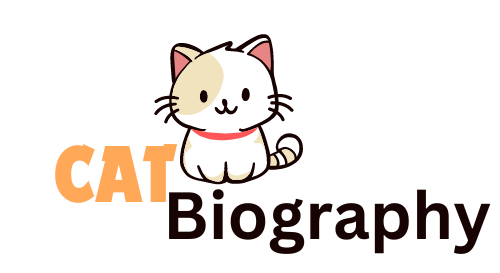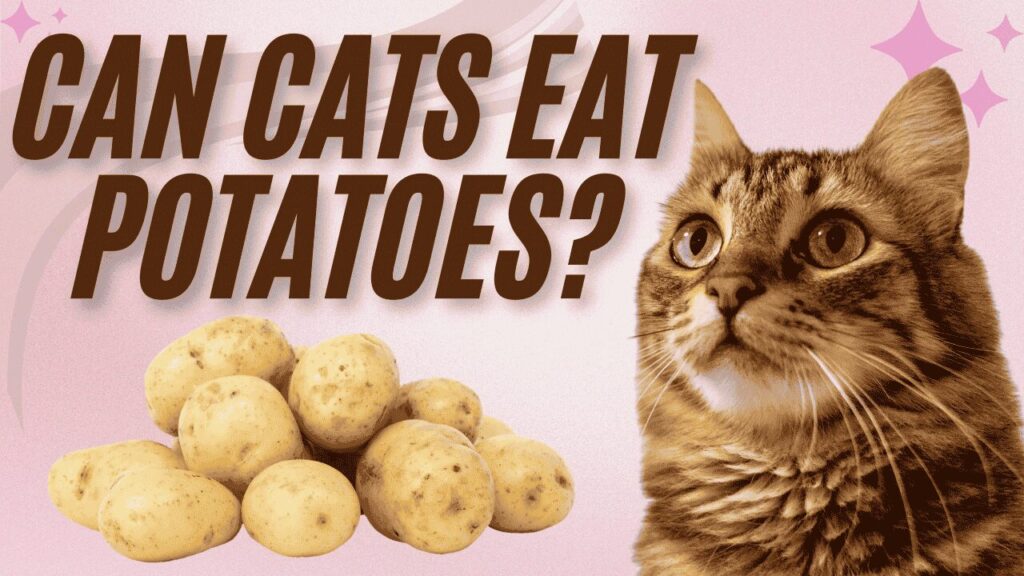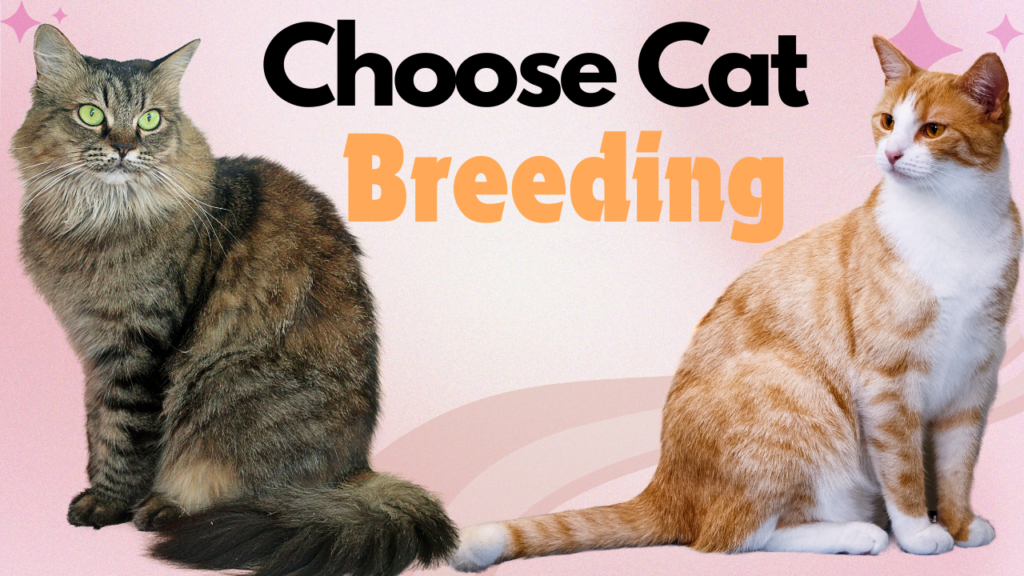Cats are curious creatures, often exploring their surroundings and occasionally eyeing the food on our plates. As responsible pet owners, it’s natural to wonder whether certain human foods are safe for our feline friends. One such food is potatoes. Can cats eat potatoes? Let’s dive deep into this topic to understand the benefits, risks, and proper ways to handle potatoes for cats.
Are Potatoes Safe for Cats?
In general, potatoes can be safe for cats when prepared correctly and served in moderation. However, there are significant factors to consider before offering potatoes to your pet. While cooked potatoes can provide some nutritional benefits, raw potatoes and certain potato preparations can be harmful or toxic to cats.
Nutritional Value of Potatoes
Potatoes are rich in carbohydrates, vitamins, and minerals, making them a staple in human diets.here’s detailed overview of the essential nutrients present in potatoes.
- Carbohydrates: Potatoes mainly consist of starch, which is a form of carbohydrate. While beneficial for humans, cats are obligate carnivores, meaning their primary energy source should come from animal proteins, not carbs.
- Vitamin C: While this antioxidant is essential for humans, cats can synthesize their own Vitamin C and don’t require it from external sources.
- Potassium: This mineral supports healthy nerve and muscle function in cats but is already adequately provided by a balanced feline diet.
- Fiber: A small amount of fiber from potatoes can aid digestion, but excessive fiber may cause gastrointestinal upset.
Raw Potatoes: A Definite No for Cats
Raw potatoes are toxic to cats due to the presence of solanine, a natural compound found in raw potatoes, their skins, and even their leaves. solanine can lead to serious health issues in cats, including symtoms like.
- Vomiting
- Diarrhea
- Lethargy
- Tremors
If you suspect your cat has ingested raw potatoes or their peel, contact your veterinarian immediately.
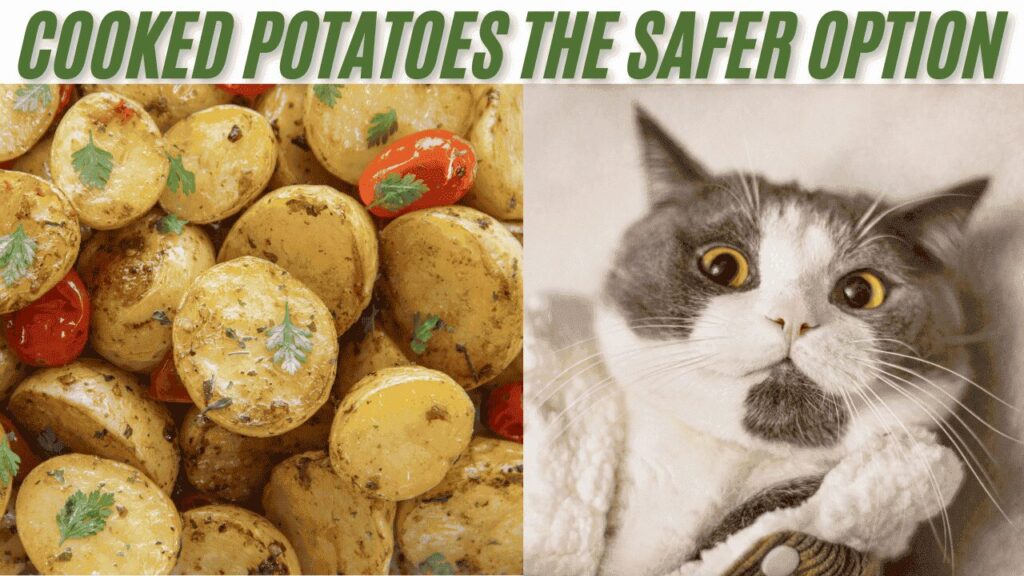
Cooked Potatoes: The Safer Option
Cooked potatoes, such as boiled or baked potatoes without added seasonings, can be a safer option for cats. When offering cooked potatoes to your cat:
- Remove All Additives: Avoid salt, butter, oils, or any spices, as these can upset your cat’s stomach.
- Mash or Cut into Small Pieces: Ensure the potato is easy for your cat to chew and digest.
- Offer in Moderation: Potatoes should only be an occasional treat and not a significant part of your cat’s diet.
Potatoes to Avoid
Certain potato preparations should always be avoided when it comes to feeding your cat:
- French Fries: These are loaded with salt, oil, and unhealthy fats, which can lead to obesity and digestive issues.
- Mashed Potatoes: Mashed potatoes often contain butter, milk, and spices, all of which can upset a cat’s stomach or cause allergic reactions.
- Potato Chips: High in salt and additives, chips are unsuitable for cats.
Can Cats Eat Sweet Potatoes?
Sweet potatoes differ from regular potatoes and are generally safer for cats. While they are not toxic, they are still not a necessary part of a cat’s diet.sweet potatoes contain a high amount of sugar , which can contribute to weight gain if overfed.if you choose to give your cat sweet potatoes, make sure they are thoroughly cooked and from any seasoning.
Potential Benefits of Potatoes for Cats
When prepared correctly, potatoes can provide minor benefits to your cat, such as:
- Digestive Aid: The fiber in potatoes can promote healthy digestion.
- Energy Boost: A small amount of carbohydrate can be an occasional energy source.
Despite these potential benefits, it’s important to remember that a cat’s primary diet should consist of high-quality animal proteins and fats.
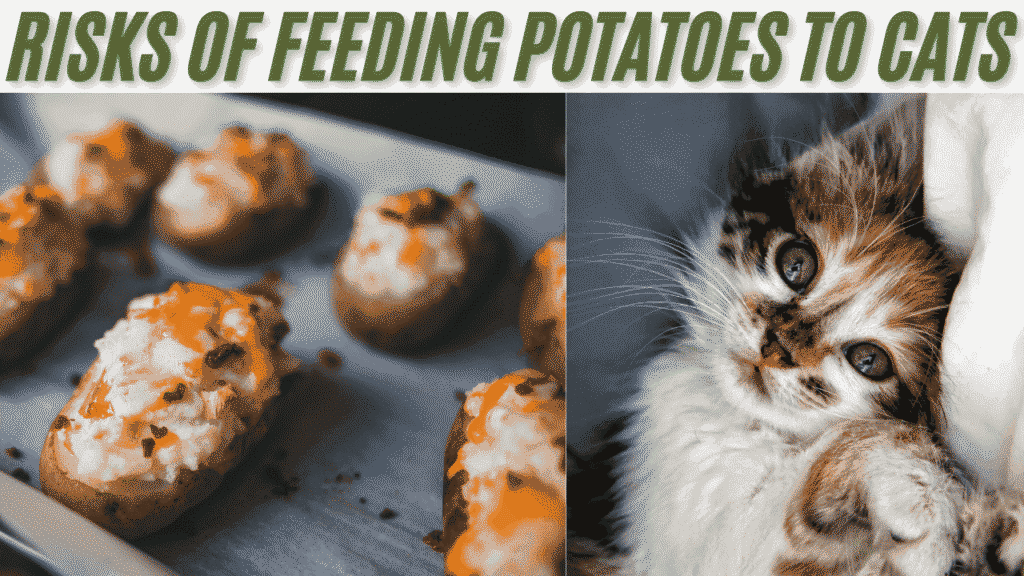
Risks of Feeding Potatoes to Cats
Feeding potatoes to cats comes with several risks, especially if not prepared properly:
- Toxicity from Raw Potatoes: As mentioned earlier, raw potatoes contain solanine, which is highly toxic to cats.
- Obesity: Potatoes are calorie-dense, and excessive consumption can contribute to weight gain in cats.
- Allergic Reactions: Some cats may have sensitivities or allergies to potatoes, leading to vomiting, diarrhea, or skin issues.
How to Introduce Potatoes to Your Cat’s Diet
If you decide to offer potatoes as a treat, follow these steps to ensure your cat’s safety:
- Start Small: Offer a tiny piece of cooked potato and observe your cat for any adverse reactions.
- Monitor for Symptoms: If your cat shows signs of gastrointestinal upset, discontinue feeding potatoes immediately.
- Limit Frequency: Potatoes should never replace a balanced cat diet and should only be an occasional treat.
Healthy Alternatives to Potatoes for Cats
Instead of potatoes, consider these healthier treats that align better with a cat’s dietary needs:
- Cooked Chicken or Turkey: Rich in protein and easy to digest.
- Canned Tuna or Salmon: A flavorful source of omega-3 fatty acids.
- Pumpkin: Great for digestion and safe in small amounts.
- Cat-Specific Treats: These are specially formulated to meet your cat’s nutritional requirements.
Conclusion: Should You Feed Potatoes to Cats?
While cooked potatoes can be safe for cats in small quantities, they are not an essential or highly beneficial part of a feline diet. Raw potatoes, seasoned preparations, and potato-based junk foods are strictly off-limits. If you ever have doubts, consult your veterinarian before introducing any new food to your cat’s diet.
Remember: Your cat’s health and well-being depend on a nutritionally complete diet designed for their unique needs. Potatoes, if offered, should only serve as an occasional treat.
# : if you want to more information of this topic to click here see more
# : READ ANOTHER POSTS
1 : Can Chicken Nuggets Kill Cats? An In-Depth Analysis
2 : Can Cats Eat French Fries? A Comprehensive Guide for Pet Owners
3 : Can Cats Eat Turkey? A Comprehensive Guide for Pet Owners
4 : How to Measure Your Cat’s Heart Rate While Purring: A Comprehensive Guide
